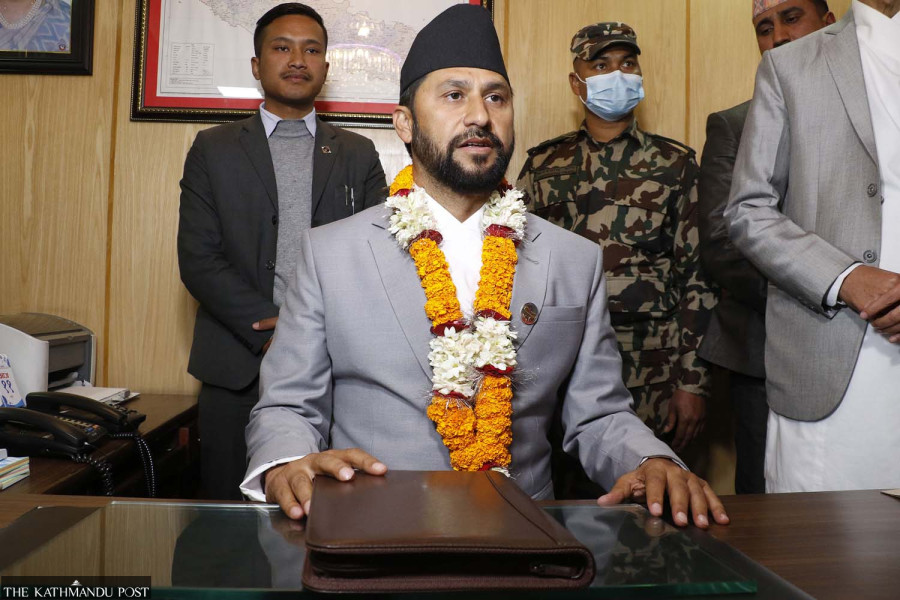Politics
A parlous path ahead for Rabi Lamichhane
Within six months of quitting TV job, the Rastriya Swatantra Party chief has emerged as one of most powerful leaders.
Nishan Khatiwada
Rastriya Swatantra Party president Rabi Lamichhane took the oath of office and secrecy as Deputy Prime Minister and Home Minister at the Sheetal Niwas on Monday—a remarkable turn of events for a person who was running a TV show until six months ago.
The Rastriya Swatantra Party—which Lamichhane formed after resigning from his TV job in June just five months prior to the November 20 elections—emerged as the fourth-largest force in the House of Representatives (HoR) in its first-ever elections. The party won 20 federal seats. Its head has now bagged a coveted ministry, becoming one of the country’s most influential leaders.
Close aides to Lamichhane say one factor behind his and the party’s rapid rise is Lamichhane’s personality. Or a cult of personality, as political analysts put it.
Mukul Dhakal, RSP’s general secretary and spokesperson, said the public trust in their teamwork and the team’s confidence coalesced into its electoral success. “Many factors played a role in our rise and one of them is Rabi Lamichhane’s charismatic personality,” Dhakal said.
Lamichhane’s popularity soared after he started hosting a TV show Sidha Kura Janata Sanga—or straight talk with the people–on News24 channel, beginning in 2017.
The show put a spotlight on the problems faced by the people but also, in many cases, helped victims get justice. It highlighted corruption, mismanagement and abuse of authority in the government, society and bureaucracy. He often confronted on air those accused of abusing power. The programme helped Lamichhane create a huge fan base—especially among disenchanted youths, working-class people and migrant workers slaving away in the Gulf.
Later, when Lamichhane joined the new Galaxy 4K Television channel, he continued to host the show. By then, he had already become a television star and a youth icon.
Resigning as the managing director of Galaxy 4K on June 16, 2022, Lamichhane announced his candidacy for federal polls. As Lamichhane decided to join mainstream politics, intellectuals and youths, in hordes, congregated and joined his campaign. On June 21, he announced the formation of the Rastriya Swatantra Party (RSP) with a 21-member central committee. The party was registered with the Election Commission on July 1.
The party contested last month’s elections with a bell as its election symbol. The symbol quickly became popular among the masses. The party fielded candidates in 131 constituencies for the federal polls. However, it chose to stay away from the provincial elections. To stand out, the RSP conducted primaries to pick its Proportional Representation candidates.
The party earned the status of a national party in the lower house in its very first try.
“Lamichhane and his party rose to power on the back of reactive politics,” said Pitambar Bhandari, a political analyst. “They captured the imagination of the public that was getting increasingly frustrated with traditional parties. That’s why reactive politics got more space in federal elections.”
Lamichhane’s swift rise, however, has left some questions unanswered, say some observers.
Political analyst Rajesh Gautam said the way Lamichhane has been elevated to power in a short period “raises some questions as Nepali politics is not conducive to such overnight success”.
Also, a case questioning the legitimacy of Lamichhane’s Nepali citizenship is sub judice.
Prior to its president joining the Dahal-led government, some RSP leaders were of the view that the party had gotten the mandate to be a strong opposition, the watchdog of the government. So they needed to build up the party first.
Before finalising the list of candidates to be picked under the PR category, some leaders had even reached the central office to warn the leadership not to join the new government. They said the party’s fourth position in the elections hinted that the public wanted to see it play the role of an effective opposition.
But Lamichhane had already made up his mind to join the new government, regardless of whoever led it.
With this, disenchantment has surfaced in the party.
RSP central committee member and press coordinator Ganesh Karki on Monday wrote a note of dissent to express his dissatisfaction, stating that the party had rushed to join the Dahal-led government.
“We solicited votes claiming we are different and will remain so. We said we will act differently when hopelessness was rife in the general public as other parties were joining and leaving alliances to serve their interests. Why did we, in the same way, rush to join power? I don’t have an answer,” the note read.
Party leaders close to Lamichhane, however, claimed that he did what was right for the party.
“We see the government as the right platform to perform and deliver,” said Dhakal, the party general secretary. “Many suggested we learn first. But learning differs in the legislature and the executive. That’s why we needed to join the government.”
Lamichhane has challenges galore as he has joined hands with the parties that he had bitterly criticised in the past, experts say.
“As dissent has already surfaced in the party, first he needs to justifiably answer how and why he decided to join the government,” said Bhandari.
Lamichhane’s speeches where he can be heard lashing out at the traditional parties’ leaders are now viral on social media. The questions he raised will be directed at him now. He has to prove how he differs from traditional leaders,” said Bhandari.
Gautam echoed Bhandari that the main question in front of Lamichhane is why is sharing power with the leaders he had strongly criticised in the past. According to Gautam, the public had trusted him, especially the younger generation. “Lamichhane’s recent actions will make them question their trust in him.”
“There is also a high chance that the party will split as dissatisfaction builds,” said Gautam.




 21.12°C Kathmandu
21.12°C Kathmandu















